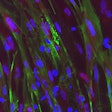
A nonprofit medical research foundation has launched a data portal designed to help spur scientific breakthroughs for the disease amyotrophic lateral sclerosis (ALS).
Target ALS said its new portal would provide “no-strings-attached access to comprehensive datasets and analysis tools to fuel discovery of treatments and biomarkers for ALS.”
The data portal is powered by Canadian company DNAstack’s Omics artificial intelligence (AI) software suite and uses Verily Workbench for secure access and analysis of multimodal ALS data.
Target ALS said the model would enable data contributors to retain sovereignty as well as measure the impact of their data while allowing for queries across a data network.
“Access to comprehensive data will enable greater understanding of ALS and fully realize the potential impact of emerging technologies like artificial intelligence and machine learning on therapeutic development,” said Manish Raisinghani, PhD, president and CEO of Target ALS.
It is estimated that at any given time around 15,000 people in the U.S. are affected by ALS. Patients experience irreversible degeneration of motor neurons, which are the nerve cells in the spinal cord and brain that control the muscles needed for breathing, walking, and swallowing, among other daily activities.
The cause of sporadic ALS and why it strikes some people and not others is not known. However, scientific evidence suggests that both genetics and environment play a role in motor neuron degeneration and development of the disease.
Through the portal, Target ALS, which was founded in 2013, is making available data collections from its scientific core facilities, including postmortem tissue, longitudinal biofluids, and stem cells. The organization says data can be mined for multi-omic analysis to identify novel pathological and genetic biomarkers of both sporadic and genetic forms of ALS and their progression. Researchers will retain full rights to any intellectual property stemming from their discoveries.
The Postmortem Tissue Collection is a biobank of datasets from ALS samples and control cases including frozen tissue. It includes whole genome sequencing, spatial and bulk transcriptomics, semi-quantitative histopathology, digitized images of pTDP43 staining, and clinical and demographic data from 260 ALS cases, frontotemporal dementia (FTD) cases, and non-neurological controls.
Target ALS said new data will be uploaded every four to six months. The Natural History Study and Stem Cell Collections will be launched on May 1, 2024.
Access to the data is free, and information on storage, computer, and data management fees is available on the portal, which has received feedback from several scientists from academia and industry who have tested it.
“This platform will broaden access throughout the scientific community, to arguably the largest postmortem omics repository in ALS/FTD (frontotemporal dementia), accelerating research in these devastating diseases,” said Dwight Newton, PhD, senior computational biologist at Roche Canada.
“We believe that data drives discoveries, yet, too often, researchers cannot access large or diverse enough data to answer questions,” said Marc Fiume, PhD, chief executive officer at DNAstack.
“We are thrilled to collaborate with Target ALS to help amplify the impact of data with a shared vision to accelerate a path to effective treatments,” he added.
Dr. Andrew Trister, PhD, chief medical and science officer at Verily, said that through the use of Workbench, researchers would be able to collaborate on analyses to advance their understanding of the disease.



















